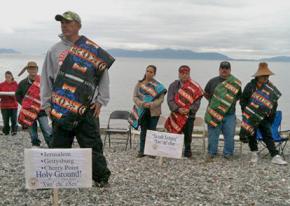Pushing back the polluters in Washington
reports from Western Washington on demonstrations, actions and public speak-outs aimed at stopping corporate polluting.
MAY WAS a busy month for environmental activism in Western Washington, with three events underscoring the importance of organizing against the destruction of the land and waterways by coal and other energy corporations.
On May 9, the Army Corps of Engineers denied a permit to build the Gateway Pacific Terminal at Cherry Point near Bellingham, Washington, largely because of the work of Indigenous activists. The permit denial was a huge victory for the Lummi Nation and other activists who staged a long struggle. If built, the $700 million facility would have been the largest coal export terminal in North America.
The Lummi Nation sent a letter to the Corps in January 2015 pointing out the ways that the project would impact the 13,000 acres of tidelands and adjacent waters that the nation manages, and showing how those impacts would violate existing treaty rights.
Lummi council member Jay Julius spoke about the positive attitude the nation members maintained throughout the fight. "We never ever doubted," said Julius. "We always had faith we would win." Julius also praised the efforts of activists outside of the reservation boundaries who helped the nation to win.

Lummi Nation Chair Tim Ballew recognized the broader significance of the victory. "This is more than a victory for our people," Ballew stated. "It is a victory for treaty rights."
AS PART of Break Free from Fossil Fuels, a week of coordinated international actions in support of ending dependence on fossil fuels on May 3-15, activists gathered and encamped near Anacortes, Washington, at March Point, the location of two oil refineries owned by Shell and Tesoro oil companies.
Hundreds of activists took part in the protest the May 13 weekend, with 150 protesters camping on the railroad tracks that lead to the refineries, successfully shutting down the tracks for two days. Police arrested 52 protesters, who were cited for trespassing.
The social justice group Raging Grannies was among the groups that protested. "I am here for my 12 great-grandchildren," 93-year-old Shirley explained. "All children deserve a future."
Many "kayaktivists" appeared in the bay bordering the refineries. "People power matters," said Emily Johnston, who had previously participated in a blockage of the Seattle harbor to protest Shell Oil's plans to drill for oil in the Arctic. "We really need to hold the fossil fuel industry accountable."
The kayaktivists were complemented by a flotilla of Indigenous people in canoes who staged a landing between the two refineries.
Susan McRae of Olympia was among the participants who emphasized that climate change has reached a crisis point, stating, "Our climate is changing so much more quickly than anyone anticipated."
ON May 24, some 1,000 people packed the Cowlitz County Exposition Center in Longview, Washington, for a public hearing on the Draft Environmental Impact Statement on the proposed construction of the Millennium Bulk Logistics coal terminal.
If built, the $680 million terminal would store in the open air some 44 million tons of Rocky Mountain coal annually for export to Asia. The hearing was divided into two four-hour sessions, and during the break in between, activists attended a rally outside the center.
As they have in previous actions, Indigenous communities played an active part at the hearing. During the rally, Raymond Estrada of the Yakama Nation represented traditional fishers of the Columbia River through which additional tanker ships would travel if the project is allowed. Estrada explained that water pollution starts by infecting the river's fish, but eventually affects the entire food chain.
Alaina Buffalo Spirit of the Northern Cheyenne Tribe came all the way from southeastern Montana to oppose the terminal. At the rally, she talked about how coal strip-mining has damaged the land, air, water and people of her area. But she also described how the people of the tribe stopped construction of the Tongue River Railroad, which would have facilitated more mining in the area.
"When my great-granddaughter asks me what I did to preserve our air, land and water, I want to be able to tell her 'Google my name!'" Buffalo Spirit said.
Children also took part in the hearing. At the second session, a 13-year-old Longview resident told the hearing panel, "I don't want to live in a town covered with coal dust. But I'm a kid and I don't have a choice. You are adults and you do have a choice. Make the right one!"
The Sierra Club reports that at the hearing overall, opponents of the project outnumbered supporters 3-to-1.
Activists know that there's far more work to do to put an end to the burning of fossil fuels. But two of the largest three coal companies in the U.S., Peabody Energy Corporation and Arch Coal Inc., have filed for bankruptcy. So there's hope that this most plentiful and dirtiest of fossil fuels may be on the way out.


